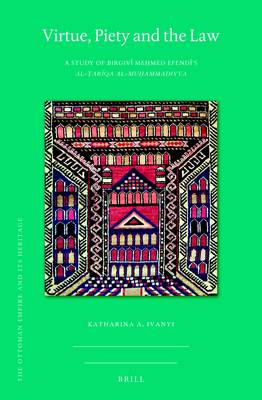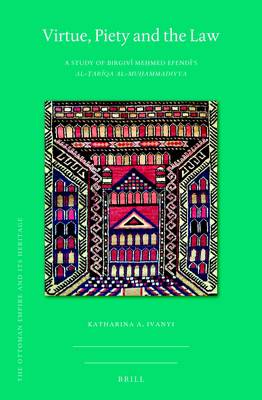
- Afhalen na 1 uur in een winkel met voorraad
- Gratis thuislevering in België vanaf € 30
- Ruim aanbod met 7 miljoen producten
- Afhalen na 1 uur in een winkel met voorraad
- Gratis thuislevering in België vanaf € 30
- Ruim aanbod met 7 miljoen producten
Zoeken
Omschrijving
In Virtue, Piety and the Law Katharina Ivanyi examines Birgivī Meḥmed Efendī's (d. 981/1573) al-Ṭarīqa al-muḥammadiyya, a major work of pietist exhortation and advice, composed by the sixteenth-century Ottoman jurist, Ḥadīth scholar and grammarian, who would articulate a style of religiosity that had considerable reformist appeal into modern times.
Linking the cultivation of individual virtue to questions of wider political, social and economic concern, Birgivī played a significant role in the negotiation and articulation of early modern Ottoman Ḥanafī piety. Birgivī's deep mistrust of the passions of the human soul led him to prescribe a regime of self-surveillance and control that was only matched in rigor by his likewise exacting interpretation of the law in matters of everyday life, as much as in state practices, such as the cash waqf, Ottoman land tenure and taxation.
Linking the cultivation of individual virtue to questions of wider political, social and economic concern, Birgivī played a significant role in the negotiation and articulation of early modern Ottoman Ḥanafī piety. Birgivī's deep mistrust of the passions of the human soul led him to prescribe a regime of self-surveillance and control that was only matched in rigor by his likewise exacting interpretation of the law in matters of everyday life, as much as in state practices, such as the cash waqf, Ottoman land tenure and taxation.
Specificaties
Betrokkenen
- Auteur(s):
- Uitgeverij:
Inhoud
- Aantal bladzijden:
- 278
- Taal:
- Engels
- Reeks:
- Reeksnummer:
- nr. 72
Eigenschappen
- Productcode (EAN):
- 9789004419865
- Verschijningsdatum:
- 1/10/2020
- Uitvoering:
- Hardcover
- Formaat:
- Genaaid
- Afmetingen:
- 155 mm x 235 mm
- Gewicht:
- 538 g

Alleen bij Standaard Boekhandel
+ 421 punten op je klantenkaart van Standaard Boekhandel
Beoordelingen
We publiceren alleen reviews die voldoen aan de voorwaarden voor reviews. Bekijk onze voorwaarden voor reviews.








